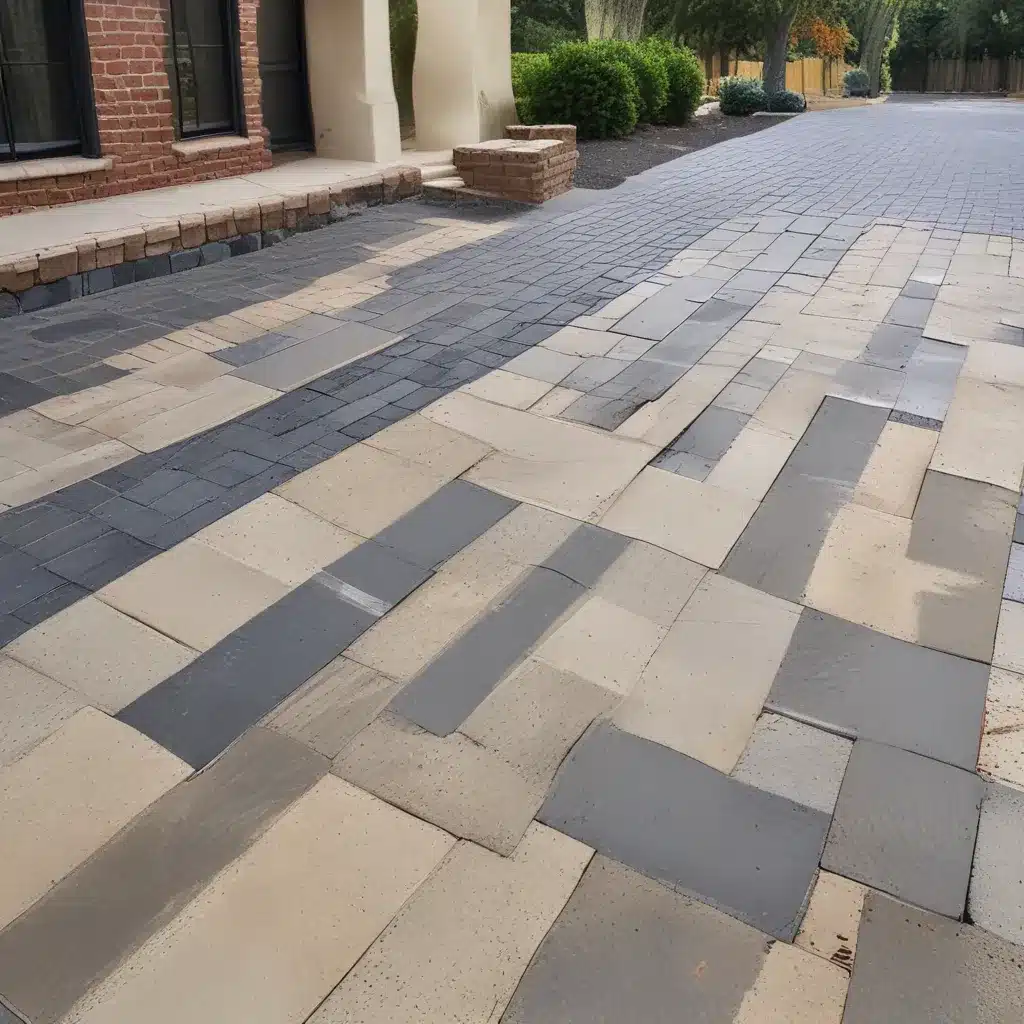As the owner of a modest but charming Tudor bungalow in Temecula, California, I’ve been pondering the age-old question: should I go with pavers or concrete for my driveway and patio renovations? It’s a decision that’s been weighing heavily on my mind, and I’m sure many of you homeowners out there can relate.
The Aesthetics Dilemma
You see, my house has a certain je ne sais quoi about it – a touch of elegance that I’m afraid a simple poured concrete slab just won’t do justice to. I mean, just the thought of a plain, monotonous driveway makes me cringe. It’s like wearing sweatpants to a fancy dinner party – it just doesn’t fit the vibe, you know?
On the other hand, I’ve been eyeing those gorgeous paver designs, with their intricate herringbone patterns and subtle color variations. They seem to scream “curb appeal” in a way that concrete just can’t match. It’s like the difference between a beautifully arranged charcuterie board and a slice of plain old white bread. The choice is clear, right?
The Cost Conundrum
But then, the pragmatic side of me can’t help but wonder: is the cost of pavers really worth it? I mean, I’ve heard horror stories of driveway renovations that ended up costing an arm and a leg. And let’s be honest, my bank account isn’t exactly overflowing with cash these days.
According to HomeAdvisor, a standard paver driveway can cost anywhere from $6,100 to $30,400, while a concrete driveway is a more modest $1,800 to $6,000. That’s quite a difference, and it’s got me scratching my head.
Durability and Maintenance
But wait, there’s more to consider than just the initial price tag. What about the long-term durability and maintenance requirements? After all, I don’t want to be stuck constantly patching and repairing my driveway or patio.
As it turns out, pavers have a distinct advantage in this department. According to the folks over at Bob Vila, pavers can withstand up to four times the weight of a concrete slab and have an average lifespan of 50 to 100 years. Concrete, on the other hand, is more prone to cracking and typically lasts around 25 to 30 years.
And when it comes to maintenance, both materials require some TLC. Pavers need the occasional power washing and resealing, while concrete needs regular sealing and patching of any cracks or chips. But from the sounds of it, the pavers might be the lower-maintenance option in the long run.
Weighing the Options
So, after considering all of these factors, where does that leave me? Well, I’ll admit, the allure of those stunning paver designs is hard to resist. And the thought of not having to worry about constant driveway repairs is certainly appealing.
But then there’s that price tag. Ouch. I mean, I’m all for investing in the long-term value of my home, but I also don’t want to break the bank in the process. After all, I still need to save up for that dream vacation to Temecula’s wine country, you know?
The Final Decision
In the end, I think I’m going to have to go with a compromise. Maybe I’ll opt for a paver patio in the backyard, where I can really showcase those intricate patterns and elevate my outdoor entertaining game. But for the driveway, I might just stick with a nice, simple concrete slab.
Sure, it may not be as visually striking as the pavers, but it’ll get the job done and won’t require me to take out a second mortgage. And who knows, maybe I’ll even splurge for a fancy stained or stamped concrete finish to add a little extra pizzazz.
At the end of the day, it’s all about finding the right balance between form and function, style and practicality. And I think I’ve finally found that sweet spot for my Temecula bungalow. Pavers in the back, concrete in the front – a winning combination, if I do say so myself.




